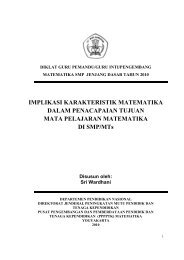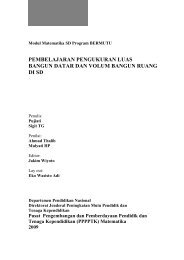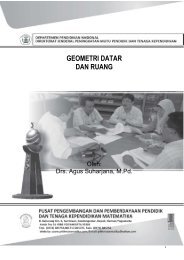25 Biggest Mistakes Teachers Make and How to Avoid Them
25 Biggest Mistakes Teachers Make and How to Avoid Them
25 Biggest Mistakes Teachers Make and How to Avoid Them
Create successful ePaper yourself
Turn your PDF publications into a flip-book with our unique Google optimized e-Paper software.
248 <strong>25</strong> <strong>Biggest</strong> <strong>Mistakes</strong> <strong>Teachers</strong> <strong>Make</strong> <strong>and</strong> <strong>How</strong> <strong>to</strong> <strong>Avoid</strong> <strong>Them</strong><br />
Cognitive, Thinking, or Perceptual Outcomes<br />
• Many nurture unhealthy memories for many years without intervention.<br />
• Their perceptions of their abilities may be affected.<br />
• Some may fail <strong>to</strong> see school as a safe haven of learning <strong>and</strong> fun.<br />
• They may generalize the traumatic experience <strong>to</strong> other situations.<br />
• They may promise themselves that they will not let their children<br />
experience what they had <strong>to</strong> go through.<br />
Affective Outcomes or Feelings<br />
• They may experience feelings of fear, shame, depression, sadness, anxiety,<br />
frustration, grief, or other socially h<strong>and</strong>icapping emotional disorders.<br />
• Some may continue <strong>to</strong> experience intrusive flashbacks or recollections that<br />
may cause them <strong>to</strong> relive the event or experience over <strong>and</strong> over again.<br />
• Some develop an intense dislike for teachers, school, or others in educational<br />
settings.<br />
• They may experience feelings of vulnerability <strong>and</strong> a lack of trust in academic<br />
settings.<br />
• Some may have feelings of inadequacy or apathy.<br />
• They may internalize feelings of shame <strong>and</strong> have no viable outlet.<br />
• A few may get sucked up in<strong>to</strong> the pathology of the event <strong>and</strong> think it’s<br />
ok, that they deserved whatever happened <strong>to</strong> them.<br />
• Some become reactive <strong>and</strong> revenge seeking <strong>to</strong>ward teachers.<br />
Psychosocial Outcomes<br />
• Their performance may be affected in the workplace as an adult, such as<br />
not being able <strong>to</strong> give presentations because of fear of making a mistake.<br />
• A few may identify with their oppressor <strong>and</strong> do what was done <strong>to</strong> them.<br />
• They may be afraid <strong>to</strong> ask questions or seek help.<br />
• Some may be reluctant <strong>to</strong> participate in school activities.<br />
• Many become risk-averse in academic settings.<br />
• They may develop a negative self-concept. We define ourselves partly<br />
by what is communicated <strong>to</strong> us by others; some people fixate on the<br />
negative comments.<br />
• In some cases, they may cause the traumatic experience <strong>to</strong> become a<br />
self-fulfilling prophecy or they could strive <strong>to</strong> prove the teacher was<br />
wrong about them.<br />
• They may avoid academic settings years after the event, which may<br />
contribute <strong>to</strong> a lack of parent involvement in their children’s education.<br />
• Some of them may experience diminished self-esteem or self-confidence.<br />
• They may feel disempowered <strong>and</strong> through criticism, experience learned<br />
helplessness, where they have difficulty learning <strong>to</strong> be au<strong>to</strong>nomous.<br />
• Regrettably, some are moved <strong>to</strong> aggression or thoughts of aggression,<br />
mimicking what was done <strong>to</strong> them.





